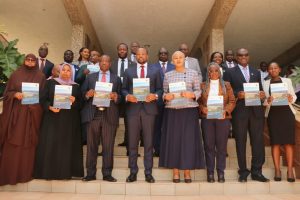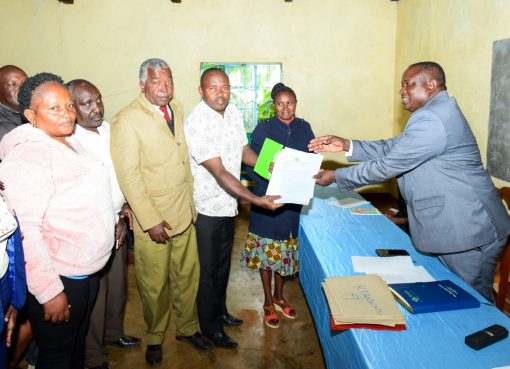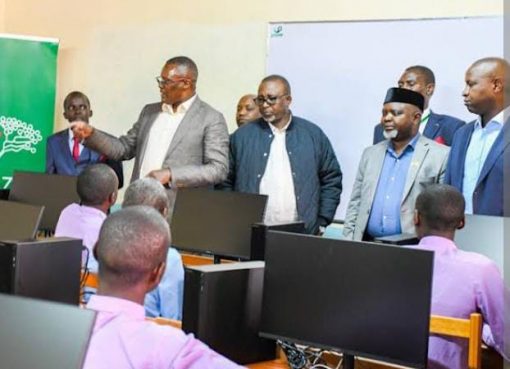The government will provide communities with title deeds through the titling programme to enable them to benefit from development projects in their areas.
The Principal Secretary for the State Department of Lands and Physical Planning, Mr. Nixon Korir, said communities have been losing benefits and, at times, compensation from development projects due to lack of title deeds.
Korir said the Department of Lands and Physical Planning, in collaboration with the National Lands Commission (NLC), has prioritised the issuance of titles and the transition of group ranches to community land to enable communities to register their parcels of land and georeference them for development purposes.

He said the Community Land Act of 2016 was passed to give effect to the provisions of Article 63(5) of the Constitution 2010 that undissolved group ranches transit to communities, saying that to date, a total of 309 inventory and undissolved group ranches have been submitted to the Chief Land Registrar by the land adjudication and settlement office.
“To date, 46 such ranches have transited to communities and have been issued with fresh title deeds under the Land Registration Act, 2012,” he said, adding that the transited land includes 21 in Samburu, 13 in Laikipia, 5 in West Pokot, 5 in Taita Taveta, and 2 in Kajiado, respectively.
A case study conducted by NLC in collaboration with NAMATI Kenya has revealed that the progress on transitioning group ranches across Kenya to community land is slow, indicating that by May 2023, only 46 out of 315 group ranches nationally had fully transitioned in a survey that began in 2017.
The research that was carried out in the four counties of Laikipia, Samburu, Kajiado, and West Pokot has established that the slow rate of progress is due to conflicts and disputes within and amongst the group members, financial constraints, inadequate information on the processes and procedures, and challenges related to the registration processes.
The PS, who was speaking on Tuesday during the launch of the Report on ‘Monitoring the Transition of Group Ranches to Community Land in Kenya’ at a Nairobi hotel, said the number of transitions from group ranches to community land was low, a need that calls for all stakeholders to work closely to alleviate the challenges hindering the transition.
Mr. Korir, who announced that his department will continue to engage NLC in the finalisation of the transit of the remaining undissolved group ranches to communities, cited the issues of boundaries, inventory, registers of members, court cases, logistical challenges, survey requirements, competing interests, and negative ethnicity, among others, as some of the challenges creating disputes and thereby slowing down the transition process.
“The inventory process is a challenge as some counties take too long to confirm the names to be used while other constituencies are big when it comes to decision-making,” said Korir.
“We still have a lot of work to do if we have to succeed in this process. There has been a lot of engagement in sensitization for a long time. Now we have to move out and channel resources to implementation and registration,” he urged.
He said the current constitution has brought everyone on board, saying that the previous Group Representative Act Cap 287, which was repealed, was discriminatory to some segments of the community as it locked women from leadership positions and made children ineligible for membership, while minorities and people with disabilities were not given the requisite recognition.
“Group ranch officials took positions to be permanent as there were no provisions for retirement. Communal security of tenure was not tenable as influential members could orchestrate dissolution and subdivision of the ranches for selfish gains,” he stated.
The PS said for the transition process to be successful, all undissolved group ranches should be fast-tracked and timelines given; there should also be enhanced inter-governmental synergy at all levels at the national, county, and grassroots levels; enhanced budgetary allocations to overcome logistical challenges; and prioritising registration of community land hosting strategic national projects and the removal of implementation bottlenecks.
“There is also a need to build partnerships, collaboration, and synergies between the executive, legislatures, Council of Governors, and corporations for resource mobilisation and advocacy in the implementation of the Act,” he added.
The PS commended NLC and NAMATI Kenya for coming up with the ‘Monitoring the Transition of Group Ranches to Community Land in Kenya’ report, which he said will help in improving livelihoods by empowering the citizenry through land tenure security.
In his remarks, the NLC Chairman, Mr. Gershom Otachi, said the report offers valuable insights into the current state of implementation, highlights common challenges, and imparts crucial lessons for stakeholders involved in ensuring that the spirit of the current progressive law is not lost in its implementation.
“NLC is committed to the continuous monitoring of the registration of all rights and interests in land and remains optimistic that the findings and recommendations of this report will enhance the security of land tenure and sustainable management of land resources in Kenya,” said Otachi.
Speaking at the event, the Director of Land and Environmental Justice and Namati Kenya, Eileen Wakesho, said the enactment of the Community Land Act 2016 and the Constitution 2010 has helped to secure land tenure rights for indigenous and local communities, as well as addressed women’s exclusion in land ownership and governance.
“Loss of communal and family lands deprives Kenya’s most vulnerable citizens, especially women, of the source of their livelihoods, heritage, identity, and political power,” she stressed.
By Bernadette Khaduli





